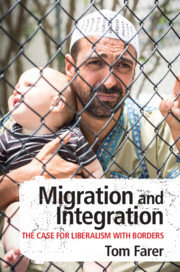Book contents
- Reviews
- Migration and Integration
- Migration and Integration
- Copyright page
- Dedication
- Epigraph
- Contents
- Figures
- Acknowledgments
- Introduction
- Part I Entry and Integration
- 1 The Looming Wave
- 2 Sovereignty, Nationalism, and Human Rights
- 3 Integration and Cultural Difference
- Part II Exemplary National Experiences
- Part III Hard Choices
- Notes
- Bibliography
- Index
3 - Integration and Cultural Difference
The Liberal’s Dilemma
from Part I - Entry and Integration
Published online by Cambridge University Press: 15 November 2019
- Reviews
- Migration and Integration
- Migration and Integration
- Copyright page
- Dedication
- Epigraph
- Contents
- Figures
- Acknowledgments
- Introduction
- Part I Entry and Integration
- 1 The Looming Wave
- 2 Sovereignty, Nationalism, and Human Rights
- 3 Integration and Cultural Difference
- Part II Exemplary National Experiences
- Part III Hard Choices
- Notes
- Bibliography
- Index
Summary
The late Samuel Huntington publicized the idea of a clash of cultures between the West and the rest. The idea of an irreducible clash has been absorbed into our angry political discourse, often conducted under the banner of “multiculturalism” pro and con. The central issue, the author writes, is how should persons with liberal views on social issues like gender equality and sexual identity and with cosmopolitan sympathies relate to groups, both native and migrant, embracing illiberal norms and practices and seeing the world through sectarian or xenophobic lenses. Should the issue be restated as: What are the proper limits of liberal tolerance? Or do liberal norms require adherents to view cultures as standing on a level plane and to accept the idea of national societies as cultural archipelagos, the position urged by Chandran Kukathas and in a more qualified way by Will Kymlicka? Can societies remain peaceful and democratic if they lack what Michael Walzer calls a common moral standpoint? The chapter explores the possible constituents of such a standpoint and illuminates the considerable overlap in values between liberal multiculturalists like Bhikhu Parekh and classical liberals like Brian Barry.
- Type
- Chapter
- Information
- Migration and IntegrationThe Case for Liberalism with Borders, pp. 49 - 78Publisher: Cambridge University PressPrint publication year: 2019

